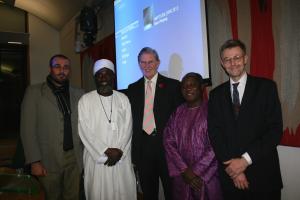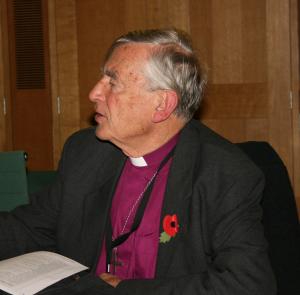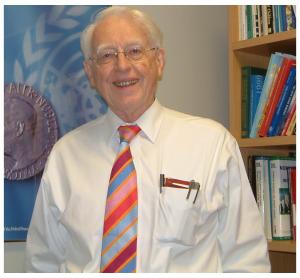Imam Muhammad Ashafa and Pastor James Wuye, from Kaduna in northern Nigeria, whose story of personal reconciliation is captured in the documentary film The Imam and the Pastor, were welcomed to the British Parliament in London last night.
 The two former rival militia leaders, turned peace ambassadors, are in Britain for the UK launch of a second film, An African Answer, which tells the inside story of their mediation efforts in Kenya between the Kikuyu and Kalenjin people of the Kenya Rift Valley, following post-electoral violence there.
The two former rival militia leaders, turned peace ambassadors, are in Britain for the UK launch of a second film, An African Answer, which tells the inside story of their mediation efforts in Kenya between the Kikuyu and Kalenjin people of the Kenya Rift Valley, following post-electoral violence there.
Introducing them, Bill Cash MP, Chair of the All Party Kenya Group who hosted the evening, spoke of the two men’s ‘fascinating insights into what has been going on in Kenya and the efforts of these brave men to try to do something that is constructive; doing things out of their own experience in a way that will truly contribute to reconciliation.’
They showed a short extract from their new film to the MPs and, in the discussion on African issues that followed, they spoke of their inter-faith and inter-ethnic peacemaking work in Nigeria, Kenya and elsewhere in Africa. ‘What we want to project is that Africans have an African answer,’ Pastor James said.
‘What you are doing and saying is music to my ears,’ Bill Cash, told them. Cash, who is also Chair of the All Party Committee on Sanitation and Water, affirmed that the British Aid budget had been ring-fenced despite the government’s spending cuts. ‘But it isn’t aid that you need but example. People like yourselves are at the rock face. It is all very well to talk about history but what can we do now?’ He offered to channel their message of reconciliation to the UK government’s Department for International Development. ‘We can be channels of peace,’ he said.
 Lord Harries of Pentregarth, the former Bishop of Oxford, appreciated ‘the witness of the two of you working together (as Muslim and Christian). That is an absolute symbol.’ He asked the two Nigerians how they were able to change the minds and hearts of people who were still ‘seething with violence and resentment’. Imam Ashafa responded by pointing to the culture of forgiveness that exists in African societies as part of a tradition of ‘restorative justice’. It was this culture to which they could appeal.
Lord Harries of Pentregarth, the former Bishop of Oxford, appreciated ‘the witness of the two of you working together (as Muslim and Christian). That is an absolute symbol.’ He asked the two Nigerians how they were able to change the minds and hearts of people who were still ‘seething with violence and resentment’. Imam Ashafa responded by pointing to the culture of forgiveness that exists in African societies as part of a tradition of ‘restorative justice’. It was this culture to which they could appeal.
Among other MPs at the reception were David Tredinnick and former government ministers Alun Michael and Stephen Timms. The event was also attended by His Excellency Dr San’g, the Deputy High Commissioner for Kenya in London, and some 30 guests from faith-based and civil society organisations.
One participant gave his vision that Africa will move from receiving to giving. ‘There will come a time when Africa will be teaching England, Africa will be teaching America,’ he said.
 Earlier in the day the two Nigerians showed their new film to 170 students at the Institute of Development Studies at the University of Sussex, one of the world’s leading centres of research and teaching on development issues. They were invited there by Sir Richard Jolly, Honorary Professor and Research Associate of the IDS, where they engaged in a lively debate with the students.
Earlier in the day the two Nigerians showed their new film to 170 students at the Institute of Development Studies at the University of Sussex, one of the world’s leading centres of research and teaching on development issues. They were invited there by Sir Richard Jolly, Honorary Professor and Research Associate of the IDS, where they engaged in a lively debate with the students.
An African Answer will have its public UK premiere at the Friends Meeting House in Euston, London, on Friday evening 12 November, in an event to be chaired by the BBC world affairs correspondent Mike Wooldridge.
